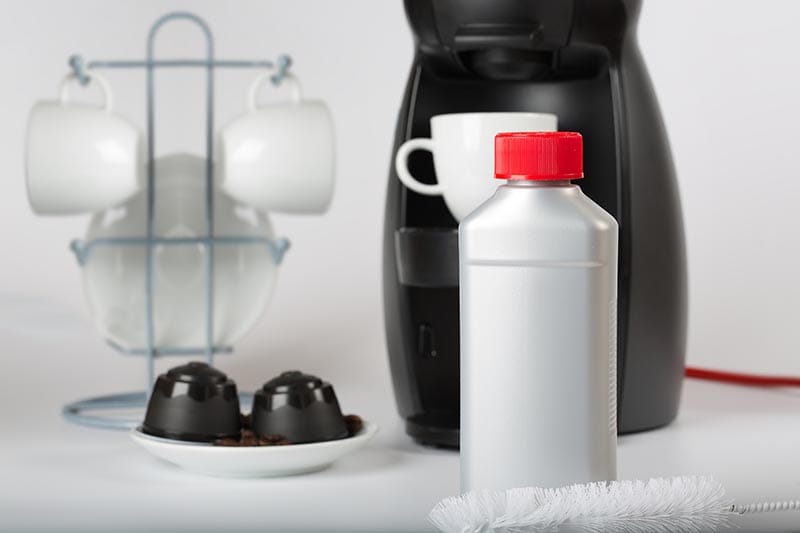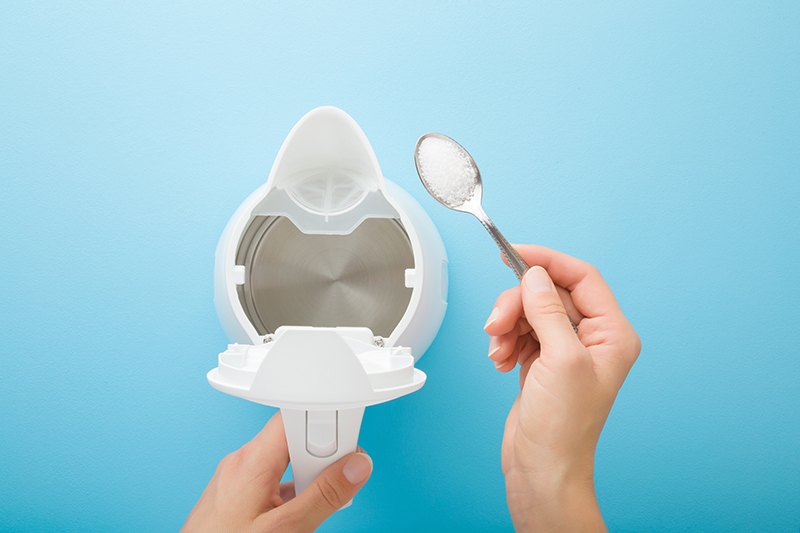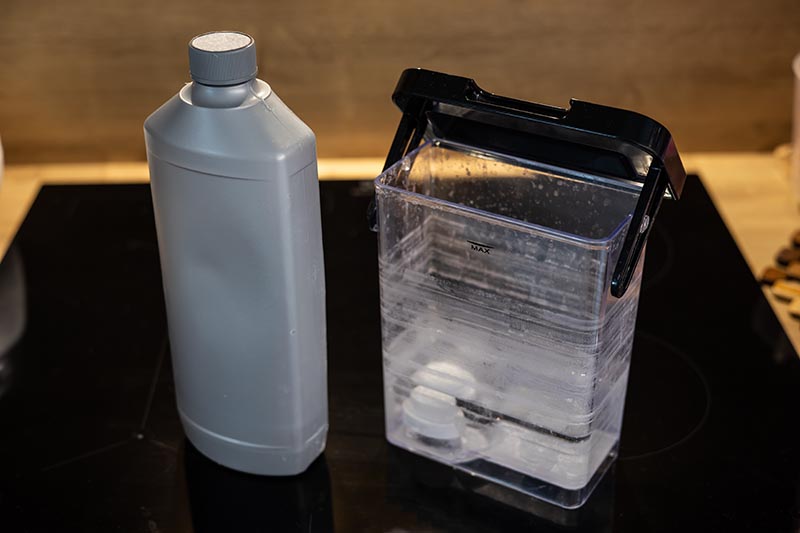What Is a Descaling Solution? (Different Types & FAQ)
-

- Last updated:

Life is more complicated when you have hard water. Or at least, it makes everyday household upkeep a more challenging task. Coffee machines need frequent flushes to keep from sputtering. Sinks and faucets suffer chalky buildups. In extreme cases, even the plumbing can become constricted and clogged. It won’t damage your health, but limescale can do a number on your wallet and sanity.
And scale isn’t just pervasive; it’s tricky. Minerals go with the flow, and water habitually follows lines we can’t reach. Rather than disassemble coffee makers or snake pipes, we use the one tool that can keep up with scale wherever it goes—descaling solutions. A descaling solution is an easy, inexpensive, and safe way to clean deposits without causing damage. You can use descaling agents on various hard surfaces, including steel, plastic, and glass.
What Is a Descaling Solution?
Removing scale is challenging because pipes and lines that hold water in appliances and machinery aren’t easy to access. You’d have to run a long snake, use abrasives, or disassemble the affected piece to clean it. Though effective, these options are time-consuming, costly, and in industrial applications, often counterproductive.
Descaling solutions usually consist of an acid. Acids break down the insoluble scale into soluble metal salts, CO2, and water that can rinse away, leaving a clean surface. Consumer and industrial products use different formulas for various minerals and sometimes include additives that slow scale growth.

What Are the Different Types of Descaling Solutions?
Descaling solutions exist in many forms for at-home and industrial uses. They generally consist of various acids, including:
- Hydrochloric acid (HCl)
- Citric acid
- Lactic acid
- Sulfamic acid
- Acetic acid
- Phosphoric acid
The acid’s effectiveness in removing the scale varies depending on its concentration and pH level. For example, concentrated HCl is far more powerful than acetic acid in the average bottle of 5% distilled white vinegar. The higher concentrations are more efficient but also present more hazards.
Home Descaling Solutions
You can make DIY descaling solutions or buy consumer products for scale around the home. Being a staple in most households, distilled white vinegar diluted in water is one of the simplest solutions for everyday scale. Citric acid is one of the most popular active ingredients in store-bought products, such as OXO BREW or Halefresh.
Industrial Descaling Solution
Industrial descaling solutions are far more powerful than residential options. Hydrochloric acid is a standard solution for industrial descaling that quickly breaks down carbonates. But many precipitates, particularly barium sulfate and other sulfates, don’t dissolve easily with chemicals. For these, an inorganic converter may come into play to change the sulfate to a carbonate for easy removal.
Chelating agents are common in industrial applications, working as descalers and scale inhibitors. The compounds isolate and trap metal ions to remove them from buildup or stop them from settling. Some acids, such as citric acid, act as chelating agents. In oil fields, chelating agents are excellent at dissolving scale without the risk of corrosion.
Ethylenediaminetetraacetic acid (EDTA) is an essential industrial chelating agent. The compound works on several non-carbonate scales that HCl won’t dissolve, and it prevents reprecipitation. It doesn’t corrode steel and presents relatively low toxicity. Apart from descaling, EDTA acts as a primary agent in chelation therapy for heavy metal poisoning in the bloodstream.
Where Are Descaling Solutions Used?
Descaling solutions are applicable anywhere that hard water can cause issues with machines or systems. Residentially, well water is a common source of hard water. Water softeners are necessary for filtration systems to protect appliances. They’ll also prevent hard water from damaging your hair and skin or causing buildup around the plumbing. Still, water softeners don’t always stop all the mineral ions from landing in the home. Common places where you may need descaling solutions include:
- Coffee makers and pots
- Dishwashers
- Washing machines
- Faucets, sinks, and drains
- Refrigerator water lines
- Water heaters
Industrial applications are even broader. Some places where businesses may use descaling include:
- Shipping and marine applications
- Boilers and heat exchangers
- Water treatment systems
- Cooling towers
- Data center cooling systems
- HVAC systems
- Condensing units
Oil and gas production is one of the most critical areas of descaling development. The briny mixtures in pipe networks appearing during oil extraction allow for a grab-bag of mineral deposits. These include barium sulfate and other hard scales that need aggressive descaling solutions.
Even an easily dissolvable scale can present problems for oilfields. Calcium carbonate and other scales can develop wax or asphaltene coatings from crude oil that don’t break down in acids. The protective layers require another solvent before descaling or, in worst-case scenarios, mechanical removal.

Advantages of Descaling Solutions
Descaling solutions offer the most straightforward avenue to combat scale around the home. Soaps can interact with hard water minerals to form soap scum. But simple household ingredients like vinegar and lemon juice can break down scale deposits around sinks and bathroom fixtures. Vinegar rinses flush coffee makers efficiently and thoroughly, removing the need for hand-cleaning.
From an industrial perspective, descalers can keep entire operations running. Scale decreases the efficiency of cooling systems, pumps, and other critical pieces of machinery. Corrosion can occur, creating costly leaks and equipment failure. In the case of oil production, the scale will completely block pipes without regular descaling or inhibitor treatments in reservoirs.
Disadvantages of Descaling Solutions
Scale can require powerful acids, presenting extreme safety risks during handling. Hydrochloric acid on the skin or in the eyes will immediately begin dissolving soft tissues, causing severe burns. And as the descalers become more effective at dissolving scale, they also present more significant threats to the metal pipes they’re trying to clean.
There are few disadvantages to using descaling solutions around the home. But one notable point of concern is accidental ingestion. A study on descalers in electric kettles determined that a significant amount of leftover solution mixing with baby milk could impact blood pH. Though risks are low, there is a limit to the safety of even mild descalers. In the least, unrinsed descaling solutions can add acidic tastes to coffee and water.
Frequently Asked Questions
What Is Scale?
In nature, water continually dissolves solid materials and deposits them as it flows. Groundwater picks up all kinds of mineral ions, including calcium, magnesium, sulfate, and bicarbonate.
Without proper filtration and softening, these minerals flow with the water wherever we need them, including household taps, appliances, and industrial machinery. As changes occur, such as pressure or temperature drops, water loses solubility. If the water is supersaturated with minerals, it will release some of them. The water deposits these minerals, leaving calcium carbonate, sulfates, rust, and other crystalline masses.
The insoluble buildup is scale. While the limescale most of us experience with residential hard water consists of calcium carbonate and magnesium sulfate, scale can appear in numerous compositions, particularly in oil and gas production fields. These can include:
- Calcium sulfate
- Barium sulfate
- Calcium phosphate
- Iron sulfide
- Strontium sulfate
When scale precipitates in water lines and fixtures, clogging occurs. Pumps become less efficient, and water flow decreases. Buildups can even be corrosive, causing significant damage to plumbing and equipment when left to grow.
What Can I Use Instead of Descaling Solution?
Descaling solutions are relatively cheap and easy to use. However, a store-bought cleaner is often no better than everyday household options when removing scale from your coffee maker or kettle. Distilled white vinegar is perhaps the simplest and most effective alternative to a consumer product.
To descale a coffee maker, fill the reservoir with vinegar and water in a 1:1 solution. Run a complete brew cycle to dissolve mineral buildup in the lines. Do two to three more cycles using only fresh water to rinse any remaining vinegar.
If you’re all out of vinegar, you can use citric acid by mixing lemon juice in the same 1:1 blend with water. And when all else fails, a few tablespoons of baking soda dissolved in water will also descale a coffee maker. The amphoteric compound will break down acids and bases in the lines. The mineral buildup will wash away alongside various contaminants that can affect the coffee’s flavor and aroma. Baking soda also works well as a paste to scrub away scale on kettles and fixtures.
Conclusion
At home and on the job site, descaling solutions play pivotal roles in keeping the operation running smoothly. Scale is an ongoing battle when you have well water, and descalers can be an essential part of your routine cleaning arsenal. Whether you use DIY solutions or a store-bought product, understanding how descaling solutions work will ensure the longest life and best performance out of your equipment.
See Also:
- 10 Car Loan Statistics and Facts
- How Many People Lease Cars in the US (2022 Update)
- What Is APR on a Car? Car Loan Terms Explained
Featured Image Credit: Tolikoff Photography, Shutterstock
Contents

